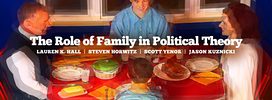Jason asks whether the family is merely functional. I think that question is harder to answer than it first appears. I take my cues on the importance of the family largely from my background in evolutionary biology. The family is crucial for individual development. Right now, at least, it cannot be replaced. Asking whether children could be raised in some kind of Skinner crib is perhaps the wrong question to ask. Perhaps the better question is why can’t we replace the family with other things? The ultimate explanation for this is rooted in evolutionary theory, but we don’t really need to go that far back. Developmentally, the family is absolutely necessary for human development of every kind. Children learn not only language and cultural norms from their parents, but also how to manage emotions, communicate, and trust. The incredible intelligence held as potential in our genes is useless until it is released, usually within the first two years of life, by interactions with loving, committed adults. Of course, this is itself a functionalist account to some degree. But more than an argument that a particular kind of society needs the family to be successful, the developmental argument for the family is that individual humans need the family to be successful humans. This of course does not mean that there are not terrible families out there and children who survive such families usually do so because there is someone else, perhaps a sibling, but maybe instead an unrelated caseworker or teacher, who cares enough to fulfill some of these basic attachment functions. But such stories are rare because the kind of commitment required to replace the family is so great that such commitment is rarely extended to non-kin.
The role of the family in human flourishing brings me to my second point, which is merely to say that families are also the source of some of the deepest human joys and sorrows life can throw at us. Families, for most people, give life meaning. While defending the family because it serves important societal functions is one way to make policy makers pay attention (maybe), it shouldn’t replace, as Jason hints, the deeper defense of the family that most people would instead recognize. The family makes life worth living. And because it’s such an important human good, it can also make life unbearable when it is corrupted. It is the family’s connection to living and living well that should make us care, not only about the functions the family serves in the Great Society, but about the fate of the family itself. Because where the family goes, we go too.

